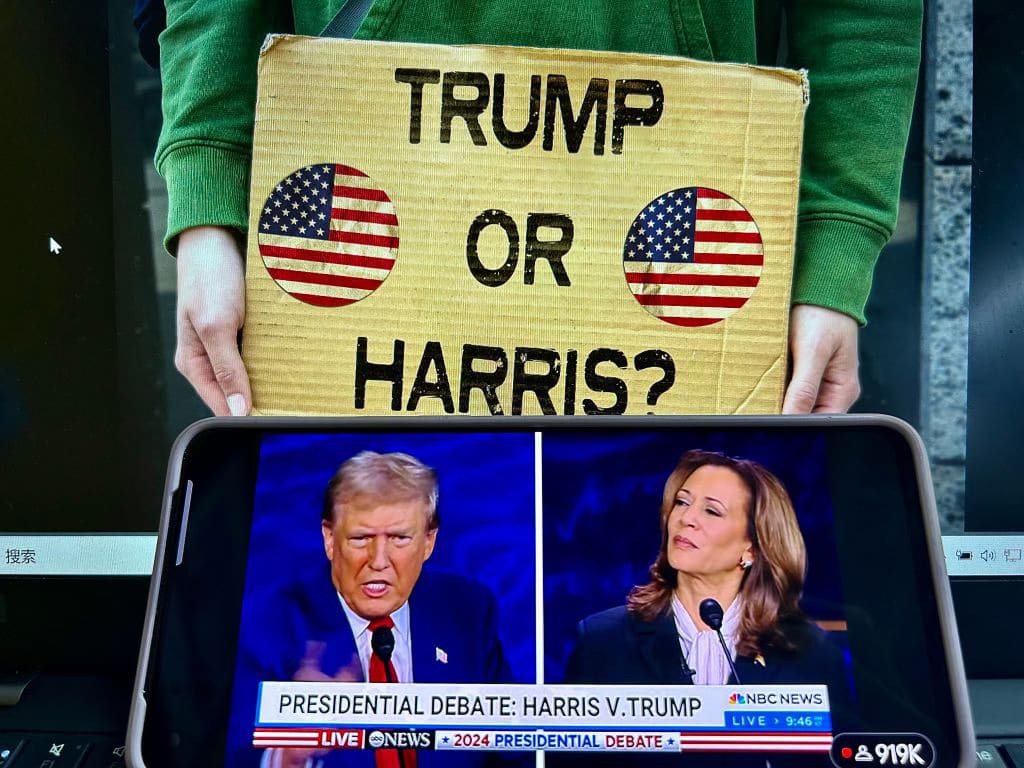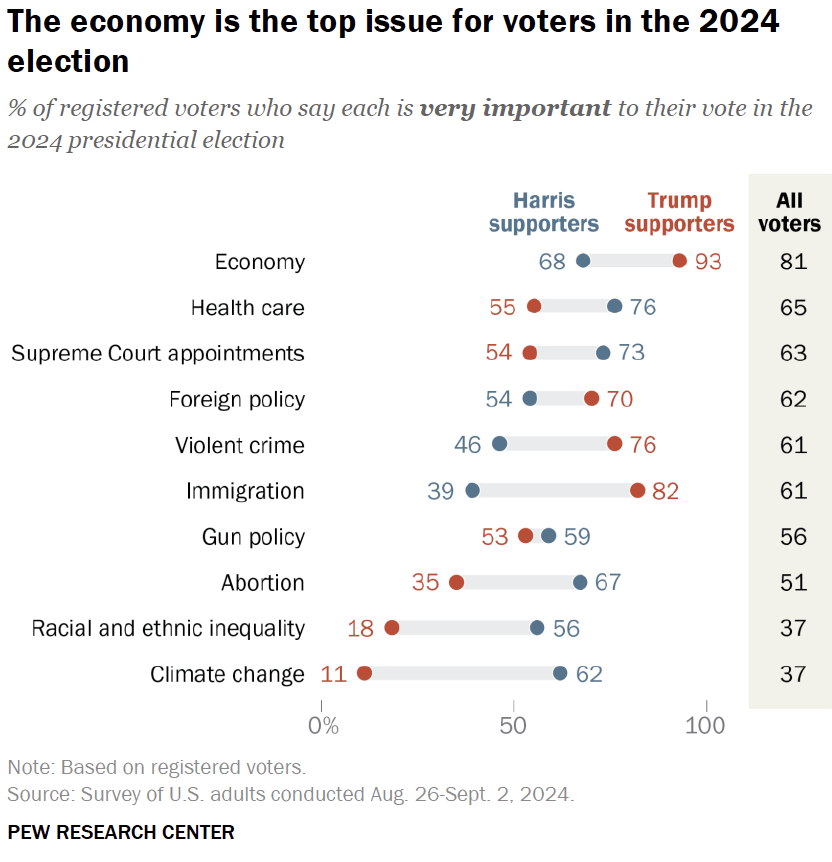What Exactly Are We Fighting About?
The election is more a culture war than a battle over competing policies and issues.
Having waged presidential warfare for almost two years now, it’s hard to believe that no overarching theme or priority has emerged to shape the election. Polarized Americans continue to fight about partisan personalities and media abstractions rather than debate clearly delineated policy differences about how to approach the nation’s biggest challenges.
There are some issues that are more important to voters than others. But the picture is vague.
Ask Americans to select the most important issues shaping their vote for president this year and you’ll typically see the economy, inflation, and immigration rise to the top with other issues like health care, crime, and abortion also emerging depending on how it’s asked in a survey.
Keep in mind, however, that these issue priorities are heavily skewed by partisanship as recent Pew data shows. As seen below, the economy, immigration, and crime are Trump voters’ most important issues while Harris supporters select health care, Supreme Court appointments, and abortion.
Notably, high-profile priorities for voters in one party are often not priorities for voters in the other party. For example, in the Pew data, 82 percent of Trump voters say immigration is very important to their vote compared to only 39 percent of Harris voters. Conversely, two-thirds of Harris voters say abortion is very important to their vote choice this year compared to only around one-third of Trump voters.
To try to get around issue polarization by party, Ipsos recently tested priorities in a slightly different manner asking voters what they most want to see in the next president and then offering a specific list of goals to choose from.
But instead of clearing things up, Ipsos found nothing really pops.
At the top of the list among voters overall—with only a 20 percent plurality—is “building an economy that gives every American a chance to succeed.” This is followed closely by “getting costs and inflation under control” selected by 17 percent of voters.
Combine these two and you could argue that roughly four in ten Americans are most concerned about a basket of economic ideas and cost issues. This doesn’t tell you much unfortunately since “the economy” usually emerges on top of voter priorities in pre-election polls without giving us any real insight into what this means in practice.
Does a concern about the economy mean voters want higher or lower taxes? Increased public investment in American jobs and businesses, or less? Do voters focused on the economy desire more social spending on things like health care, education, and housing? If so, in what order and what if anything should be cut? Do voters concerned about prices want tariffs and tighter restrictions on international trade? What about price controls? Higher or lower interest rates? More regulations or fewer regulations?
It's hard to tell what American voters really want collectively on the economy just by looking at polling, social media feeds, and campaign rallies.
Consequently, both campaigns in 2024 are essentially offering voters a combination of lower taxes and higher social spending—at least for the middle class—and a variety of random promises to somehow lower consumer prices.
A closely divided outcome this November won’t make these competing issue priorities and policy approaches any clearer, or more coherent.
More worryingly over the long term, the American political system appears to have replaced substantive issue and ideological debates between the two parties with opaque cultural fights that never seem to conclude.
Democrats say the 2024 election is all about the threat of Trump and MAGA. Or maybe it’s about democracy and freedom or abortion rights or checking plutocrats and protecting health care. Republicans say the election is all about the threat of Harris and radical leftists. Or maybe it’s about immigrants and the border or the deep state and Trump’s enemies or “wokeism” and elites.
What’s most important to the most people? Who knows? Depends on the day and the media audience.
In contrast, political independents don’t pay much attention to the rantings of party loyalists on either side and instead wonder who’s going to ensure good jobs and high wages, address high household costs, and bring some stability to their families and the country.
The views of independents at least make some logical sense given what we know about attitudes on the economy throughout the Biden years and across other democracies following the pandemic and rising inflation. This is probably why the multi-billion-dollar campaign operations of Democrats and Republicans are now focused on convincing a few million people in a handful of states who are most concerned about their finances to vote their way, albeit without much clarity on what exactly these voters want other than “something different.”
Despite the sporadic focus on the economy from Trump and Harris, the two candidates and their partisan armies mainly prefer talking to their respective bases about a litany of concerns grounded in hatred of the other side.
The economy and other issues are sideshows in the bigger symbolic fight over who gets to define and represent the country’s values.
Elections don’t follow the old scripts anymore with the two parties waging a fierce but mostly confined ideological fight over the proper size and role of government, the focus and distribution of public resources, and relative attention allotted to certain groups and areas of the country—issues and priorities that can at least be handled through legislation.
In place of the old model, the 2024 election is mostly a cultural battle, with issue priorities serving as proxies in the real fights over wildly divergent personalities, preferred groups of Americans, and increasingly incompatible value systems.
No party truly wins in this scenario—the culture war rages on.







I am a former democrat, now planning to vote Republican and hoping that the GOP can change as much as the dems have changed. I see profound differences between the parties - and their faithful. The democrats believe in big government, in private-public partnerships, in social engineering, and ( this is new) in war. The republicans have some small government genes n their DNA, and they also have "isolationism" in their history, America first, no foreign wars.
The covid pandemic destroyed my belief in big government once and for all. It was clearly a nasty flu, but did not merit an worldwide authoritarian freak out. I do not want the government overseeing what germs I breathe , and forcing me, my pregnant daughter and my grandchildren to get untested mRNA lipid nanoparticle vaccines ( that don't work). To add insult to injurty, alleged killer virus turns out to have most likely been cooked up by government funded program!
Our rights were trampled, we were lied to by the media, and no one ever apologized for lies and mistakes. Ventilators? 98% effective vaccines? Prominent scientists ( Bhattacharya of Stanford, Kulldorf etc) were censored when they questioned lockdowns. Lives were destroyed. Underprivileged children were stuck in lonely apartments with no school for TWO YEARS in some liberal cities. I will never forget and never forgive.
I am voting Republican. I love RFK Jr and Tulsi Gabbard (now with Trump). I am delighted that the two evil Cheneys have joined the democrats and left the GOP. I see a lot of substantive policy differences between the two parties. I hope the republicans can continue to shift towards more populism ( why is that a bad word). I hope to see Republican environmentalism develop that is not all about climate change and big government plans remake the economy. How about just getting chemicals out of the food and water for a start?
What a long strange trip its been.
Yes and no, Ruy. The Washington/Jefferson battles supposedly were just a culture war, but they reflected deep and critically important differences in how the culture shaped the policies. Imagine for a moment if Jefferson had won in 1796 and committed us as an ally to France. The U.S. probably would not exist. It took us another 16 years to get to the point we could repel another British invasion. Or take the formation of the Democrat Party by Martin Van Buren in 1826---ostensibly to elect Andrew Jackson, but the real goal was to protect and preserve slavery to as to prevent a civil war. It turns out from 1828 t0 1860, every single policy was a part of that "culture war" over slavery. You couldn't even send MAIL to the South if it opposed abortion . . . er, . . . slavery. No discussion in Congress was allowed that dealt with slavery.
Throughout our history culture wars are actually shorthand for real policies that dramatically shape the direction of the country. America First implies a dozen specific policies OF the culture that are inescapable: either we protect, defend, and prosper America first, or we drift into obsolescence and probably civil war or division. As a historian, I think this is the clear message of history. We defeated that impulse brought by the Democrats in 1860. Can we do it again? To be seen.